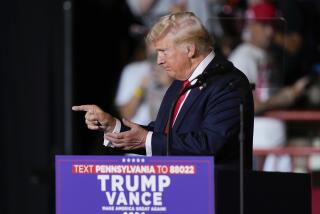Media Seek an End to Jackson Gag Order
- Share via
SANTA BARBARA — Lawyers for news organizations asked an appeals court Thursday to strike down a gag order in the Michael Jackson child molestation case.
The request called the edict by Santa Barbara County Superior Court Judge Rodney S. Melville an unconstitutional prior restraint on the freedom of speech of “third parties who have not yet appeared before the trial court or otherwise become subject to the court’s jurisdiction.”
Noting that any trial in the Jackson case is at least nine months away, attorney Theodore J. Boutrous Jr., representing a coalition of national news organizations including The Times, said Melville’s ban on comments from potential witnesses was “highly vague” and had a “particularly chilling effect” on free speech.
In recent weeks, especially since the convening of a grand jury last month, unprecedented layers of secrecy have been imposed on all parties in the Jackson prosecution and on news organizations trying to cover the high-profile case.
At one point, cameramen and photographers were threatened with contempt charges if they photographed grand jury witnesses on public streets.
The grand jury was convened to decide whether there was enough evidence against Jackson to warrant a trial on accusations that he molested a young cancer patient at his Neverland Ranch in Santa Barbara County early last year.
The panel has been meeting behind barricades for the last two weeks at a Sheriff’s Department training facility on the outskirts of Santa Barbara.
So far, the 19-member group has heard from about two dozen witnesses, including the alleged victim, his parents, a brother, a psychiatrist who examined the boy and attorney Larry Feldman, who represented another alleged Jackson victim in a 1993 case that ended in an out-of-court settlement of more than $20 million.
As the grand jury met Thursday, prosecutors and defense lawyers were preparing for another secret hearing this morning before Clifford R. Anderson III, presiding Superior Court judge in Santa Barbara, to determine whether a private investigator hired by Jackson’s lawyers could be forced to testify.
Earlier this year, sheriff’s deputies serving a search warrant at the Beverly Hills office of that investigator, Brad Miller, seized tape recordings of defense interviews with people involved in the case.
Judge Melville has so far kept the prosecution from obtaining one disputed tape, but prosecutors could question Miller about it and threaten him with jail if Anderson ruled that he must testify before the grand jury and the investigator refused.
Boutrous has asked Anderson to open today’s hearing to the public and to give advance notice of closed hearings, but the judge has not responded.
Santa Barbara criminal defense specialist Robert F. Landheer said the question of whether a defense investigator could be forced to testify before grand jurors might be one of many areas in which “new law” could be made in the coming months.
“This may be the most important issue so far,” said the attorney and law instructor. “There are going to be many issues like this that go all the way through the appellate courts.
“If you can put defense investigators before grand juries, defense lawyers will have to be asking themselves how robust they want their investigations to be,” he added.
“This is an example of the real gritty stuff of how other cases eventually will be impacted by the decisions in the Jackson case,” Landheer said.
Jackson, 45, was arrested in December on seven felony charges of lewd and lascivious behavior and two felony charges of giving an intoxicant to a minor in order to seduce him.
The entertainer is free on $3-million bail and has characterized the case against him as a “big lie” concocted by the boy and his mother to extort money from him.
In addition to the moves in the criminal case, an amendment to a 1999 trust deed between Jackson and the Bank of America that was used to secure a $6-million loan five years ago was recorded March 31 in Santa Barbara, public records revealed.
The modification of the trust deed raises the “maximum aggregate value” of Neverland from $6 million to $18 million.
Jackson’s chief financial advisor, Charles Koppelman of New York, said that, in theory, the amendment could allow Jackson to increase his loan, with Neverland as collateral.
But he said that was not the intent, and called the modification part of a “normal financial” reorganization designed to give Jackson greater liquidity.
He said Jackson could place a much greater value on the 2,700-acre ranch in the Santa Ynez Valley at any point if he ever had money problems.
More to Read
Sign up for Essential California
The most important California stories and recommendations in your inbox every morning.
You may occasionally receive promotional content from the Los Angeles Times.













